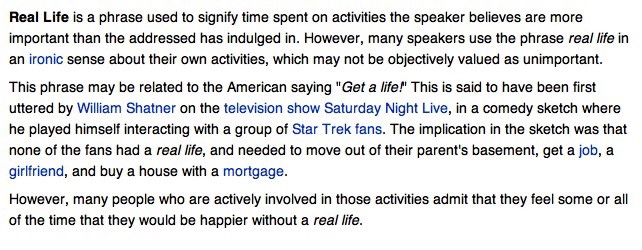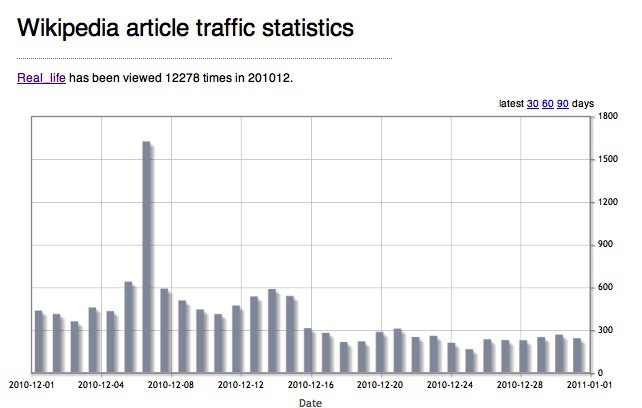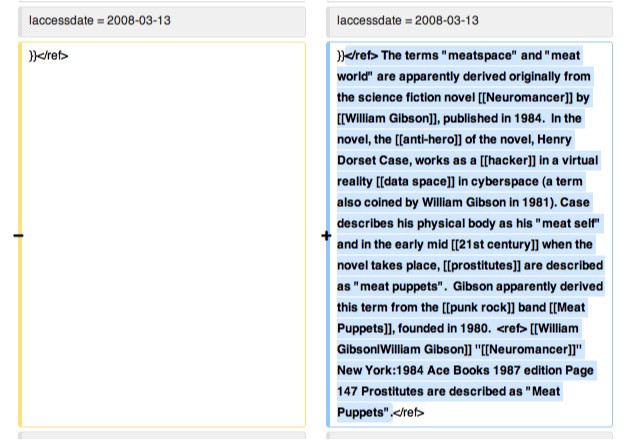What "Real Life" Means On Wikipedia
What “Real Life” Means On Wikipedia
by Jane Hu

The title of the Wikipedia entry for “Real life” differs from its disambiguation page “Real Life” through the absence of one capital letter. But while the “Real Life” (upper case) page will lead you to many films and books and songs of that name, the “Real life” entry affirms, alas, that there is only one real life. “Real life.” The topic is abstract, speculative, and possibly even redundant. (Since when, after all, was life ever un-real?) Still, as the extensive entry for “In Real Life” shows us, we have more sure things to say about reality television than we do about “real life.” Turn off the television for a moment and let’s face it: who really knows about “real life”? How do a handful of people online begin to define it?
Interestingly, the entry (in its current incarnation) is not so much about “real life” than our anxiety that we’re never living it. The opening sentence attempts to mark the limits between reality and fantasy.

It’s difficult, though, to imagine that those so committed to spending time writing and revising a Wikipedia article on “real life” would deem such acts as lying outside it. As I, for example, sit combing through rejected versions of the entry, I refuse to categorize this experience as anything but the hyper-realism that defines another day in front of my computer screen. As we shall see, meticulously defining and policing entries on a reference site isn’t just an over-analytic impulse, or a niche of geek culture — this is culture as the wired world currently knows and lives it. Real life is less and less “an actual event or life” of physical exertion and bodily closeness — “meatspace,” as it’s sometimes called. People have always lived meaningful moments of their lives through stories; in the 19th century, such lives were largely experienced through the novel and its attendant technology of the book, though there are other narratives and mediums to absorb now. So if you, like me, cultivate fairly profound attachments through various technological objects, maybe the anxiety isn’t always “this is real life,” but “which life is more real?”
WHEN DID REAL LIFE BEGIN?
Here’s a history of “real life” as Wikipedia knows it. The user Llywrch who initiated the page anticipates its very impossibility:

Perhaps, though, he wanted the entry as a clearer way to define his own life. The first sentence of his user page refers back to it:

Personal incentives aside, that was 2003 (June 1, to be exact) and the entry we’re looking at today is from today: 2012 July 18. This is how we delineate life as we know it right now. The last update was from eight days ago. Onward.
This is what the entry for “real life” looked like in June 2003:

Notice that both Real and Life are capitalized (the “Real Life” entry would not appear until the next year). As expected, the entry has changed some since then. Life (as we know it) has changed since then. Still, the basic elements are there. As with all Wikipedia pages, one has to start from something, and that something will never, ever be objective, try as you might. As though grasping at legitimacy, a literary reference to “real life” was included on 13 March 2006:

Once added, it hasn’t been deleted once (unlike, say, sections on “Christianity” and “real life” — I expect that one to be resurrected repeatedly). I doubt a line from Dostoyevsky’s The Idiot is the first, or even best, instance of the kind of “real life” the page is interrogating, but here we are today:

Often, traces of a page’s earliest editions can be discerned in its, as yet, current form. To give any online user the intellectual freedom to edit such a widely acknowledged reference site remains to my mind radically liberating and democratizing, but also downright frightening when you think of the stock people place in Wikipedia authority.
THE IRONY OF REAL LIFE
Editor Llywrch writes: “many speakers use the phrase real life in an ironic sense about their own activities, which may not be objectively valued as unimportant.” This placement of real life in the context of irony seems integral to understanding the phrase. Read the entry as it is today; one can’t help but note its ironic tenor. If you read it in your most objective tone, it won’t sound objective; it will sound like it’s making fun of you.
“Real life” is sometimes a controversial term, describing “productive” activities, such as working, in contrast to “unproductive” (leisure) activities. Outside of fictional worlds, the phrase is often used to compare a more traditional way of living against a pejoratively depicted existence, such as academic life, in a manner similar to the term “real world”.
The aggressive use of quotation marks (lacking in the first years of the page’s life) do not help. When you use “quotation marks” that much, it no longer functions as a bracket specifying a particular word under definition. It “sounds” like you are “distancing” yourself from words (and more likely phrases or sentences) by being generally “ironic” or “sassy.”
There were those who sincerely objected to having a “real life” page:


Some cared enough to want it deleted:

But not enough:

If the need to define “real life” is internet-related — is as-opposed-to-internet-existence — then the internet won that tussle.

In keeping the page around, the internet was making a statement.

GEEKS, REAL LIFE AND MEATSPACE
The earliest entry suggests that “real life” might be related to William Shatner’s “Get a life!” shouted at Star Trek fans on a “Saturday Night Live” skit. This interpretation isn’t wrong, but the relation is probably less specific and more symptomatic of an entire culture that deems “geeks,” like Star Trek fans, as not “having a (real) life.” As, indeed, perhaps not even capable of “Getting a real life,” as though life is something to be “got.”
The most-visited day for the entry, by a mile, is currently December 7, 2010:

It’s intriguing to note that this is also the date Julian Assange of WikiLeaks was refused bail. At court, Assange failed to submit a real life address, submitting first a post office box number and then “Parkville, Victoria, Australia.” As his Wikipedia entry notes, “His lack of permanent address and nomadic lifestyle were cited by the judge as factors in denying bail.” Assange perhaps was so caught up moving online data into “real life” effects, that he forgot to make that link in his own life. Who knows though; maybe we could try to crowdsource why December 7th, 2010, received such a hit?
There is a relatively yawning gap between 24 December 2003 and 20 March 2004 where the page was left unedited. The changes that came when they did, however, were significant. Not only did they continue the scifi/geek trend (importantly so), the effects of these changes are largely what define the entry today (perhaps rightly so). March 20, 2004:

While the use of “meatspace” was erased a few times during the way, by August 13th, 2011, its description had been expanded to the version we see today:

So much new information! And unlike the rest of the page, so specific. Burrow into the internet a bit more, and this “meat space” addition can be attributed to a 2005 March 2 MetaFilter (or MeFi) thread. MeFi — founded in 1999 — precedes Wiki by three years. Often, Metafilter threads read like a “View History” page on Wikipedia, but with more narrative and less back-tracking.
In the Metafilter thread, users link “meatspace” back to William Gibson’s now-canonical 1984 cyberpunk novel Neuromancer. While readers confirm that “meat” constantly appears in the novel to describe the fleshy-in-real-life world, “meatspace” never does. The convergence, however, still seems significant, and 1984 is still the earliest known mention of “meat” as in this anti-cyber context. Considering that Gibson coined “cyberspace,” it is at least poetically appropriate to also tag him to the origins of “meatspace.”
The Metafilter group begins, as any group of good researchers might, with the OED. Unlike the “real life” page (“meatspace” doesn’t have its own Wikipedia page yet), the OED “meatspace” entry hasn’t changed since 2000: it earliest citation for “meatspace” is still a 1995 Seattle Times article.
In this sagebrush ranch town where the elevation is about eight times the population, John Perry Barlow is multitasking between cyberspace, meatspace and parentspace about as well as a mere mortal can do.
By referencing the earliest use of “meatspace” from an online archive, the OED in essence admits that it cannot yet discern the earliest reference of the word. The internet is too vast, and changes too quickly. There is a reason that the OED — online or not — prefers its “evidence drawn from print publications.” A printed book doesn’t morph content with time — it cannot be deleted. The OED again:
Many correspondents seem to regard getting a word into ‘the dictionary’ as a sure route to fame and even fortune. They are often disappointed to hear that the process of adding any new word, or a new sense of an existing word, is long and painstaking, and depends on the accumulation of a large body of published (preferably printed) citations showing the word in actual use over a period of at least ten years. Once a word is added to the OED it is never removed; OED provides a permanent record of its place in the language.
If we associate “real life” with the non-online, then for the OED, real life is the anti-speculative. Unlike the OED, however, places like Metafilter and Wikipedia are as much about speculation as they are about trying to provide readers with a “permanent record,” and endlessly sprawling archive. While a Wikipedia page always tries to present its current version as the final and most authoritative one, its View History, like a Metafilter thread, spreads this process across time. A Wikipedia page is always in the process of becoming. An excavation of a Wikipedia article is concerned with the past, but I’d hazard to say that the writing of one is almost always about the future — even when focused on retelling the past. Wikipedia, like all archives, is about the prolongation of time.
“Meatspace” might initially seem a vulgar, even dismissive, expression for what amounts to the face-to-face confrontations that we usually associate with intimacy, but it’s actually a pretty apt description of the IRL space so subjected to the passage of time. Meat rots. The meat of cyberspace — as we’ve seen especially via Wikipedia — doesn’t so much decay or dwindle, than expand and accumulate over time. This might finally amount to a different kind of rot, though we couldn’t say what right now. As a fridge, the internet is far too expansive — both sophisticated and messy. Things will get lost, turned up and recycled elsewhere.
It makes sense that “in real life” sounds like a derivative of “in real time,” the latter displacing the former as a means to experience the Real through the context of the unreal internet. Further, the phrase “face time,” which precedes the internet, was used to describe interactions that weren’t just face-to-face, but interpersonally meaningful. One would (to use an internetish phrase) “log in” face time as a way of making up for being apart. Like “face time,” “real time” is a legitimizing construct. It is where supposedly profound — otherwise unachievable — closeness happens. But if you can’t experience life “in real time” “out there,” you could give it a whirl “in here,” online, with the rest of us.
Related: Case History Of A Wikipedia Page: Nabokov’s ‘Lolita’
Jane Hu lives in real life. Photo by basketman23, via Shutterstock.
